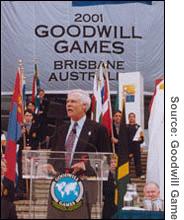|
Goodwill hurting
|
 |
September 7, 2001: 2:43 p.m. ET
This year could be the last gasp for the Cold War era Goodwill Games
|
NEW YORK (CNNfn) - This is likely the last gasp for the Goodwill Games, the international sporting competition that has seen the political, corporate and sporting reasons for its existence slip out from under it.
Started by CNN founder Ted Turner following boycotts of the 1980 Olympics in Moscow by the United States and the 1984 Olympics in Los Angeles by the world's communist nations, the games were seen as a way to remove politics from international athletics and lessen Cold War tensions.
| |

|
|
This could be the last year that Ted Turner gets to open the Goodwill Games that he founded in response to Cold War tensions. | |
But as games are held this month in Brisbane Australia, the end of the Cold War has removed the political and athletic need for the games, and two corporate acquisitions has made them the property of AOL Time Warner (AOL: down $2.48 to $32.61, Research, Estimates) rather than their founder and protector Turner.
Competing against the U.S. Open, the games are getting abysmal ratings on TNT, generally showing a decline in viewers from reruns of "Law and Order" or other syndicated programming on the cable station.
AOL didn't really have the chance to pull the plug on the games after the January completion of the merger. But the 2005 Goodwill winter games set for Calgary are probably as likely as a return to amateur athletics in the Olympics.
Thrown for a loss
Fans of college football assume that the sport is a money maker for their school, helping to support other less popular sports. But Rick Horrow, president of Horrow Sports Ventures, told CNNfn's Before Hours this week that only 45 of 900 major college football programs make money. Many other schools are cutting less popular sports to make up for football losses.
Labor pains
Baseball owners formally notified the players union that they wanted to start negotiations on a new contract this week. An edict and threat of fines from Commissioner Bud Selig has kept owners from their normal saber-rattling going into talks, and union officials have also kept a low profile.
Both sides are somewhat chastened by the work stoppage that wiped out the 1994 World Series. There's talk that owners will agree to a one-year extension of the current pact as they try to find common ground on a number of contentious issues.
But a new labor agreement without some kind of work stoppage would be a first in the lifetime of most major league players and about as likely as the Cubs winning their first World Series since 1908 – it's more possible this year than most, but still a long shot. 
|
|
|
|
|
 |

|

